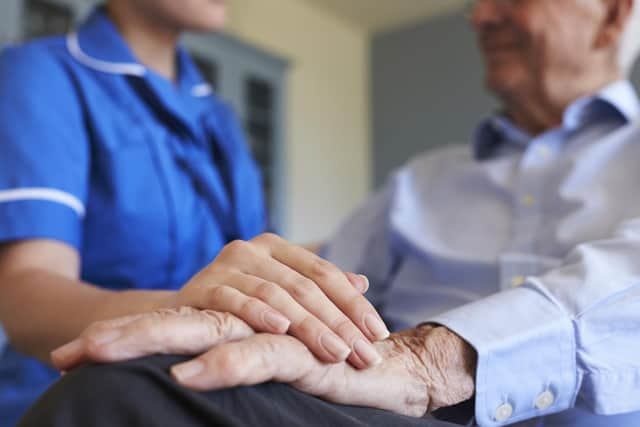Yorkshire university offering training to NHS to help them cope with coronavirus
This article contains affiliate links. We may earn a small commission on items purchased through this article, but that does not affect our editorial judgement.
The university is offering free online training to healthcare workers in the region to help them deal with the challenges of the outbreak.
Support has already been given to Rotherham, Doncaster and South Humber NHS Foundation Trust (RDaSH), to train up health care workers in the key elements of end-of-life care.
Advertisement
Hide AdAdvertisement
Hide AdJoin our new coronavirus Facebook group for the latest confirmed news and advice as soon as we get itThe aim is to help support coronavirus victims and their families, with sessions set to be rolled out across wider local NHS trusts.


Rachel Millard, RDaSH’s deputy director of nursing, said: "Dealing with the coronavirus is tough for everyone.
"Refreshing existing knowledge is vital but obviously can’t be carried out via the traditional training route in a classroom setting".
The training is led by Sheffield Hallam’s palliative care education team online via live Zoom webinars.
Advertisement
Hide AdAdvertisement
Hide AdIt focuses on identifying key basic skills while minimising anxiety, to help build confidence amongst staff and reduce the likelihood of contradictory information being shared.


With the Government advice regularly changing and being updated, the training is adapted on a week-by-week basis to reflect latest guidance.
Dr Julie Skilbeck, a senior lecturer in Nursing from Sheffield Hallam, said: "The outbreak of Covid-19 has meant that many health care colleagues in our region are now having to care for service users, and their families, who are dying as a result of the virus.
"End-of-life care has never been more critical; now more than ever staff need to be prepared to provide compassionate and dignified palliative care during the pandemic."
Advertisement
Hide AdAdvertisement
Hide AdDr Skilbeck said during interactive online conversations with colleagues, many sensitive and challenging topics have been raised, in particular how to talk to patients and their families, when breaking bad news about a person’s deteriorating condition.
She said: "All the participants have felt that the opportunity to share existing good practice and their own anxieties has gone some way to better equip them for the challenges ahead."
Jo Painter, a nurse consultant at RDaSH and lecturer in mental health at Sheffield Hallam, said: "Whilst packages of end-of-life training exist to support NHS staff, we felt it was important to offer interactive sessions to allow for two-way conversations and engagement between all the attendees."
She added: "It has relied on strong collaborative relationships being formed quickly – and these new professional relationships and networks are likely to prove invaluable well beyond the Covid-19 crisis."
Advertisement
Hide AdAdvertisement
Hide AdThe university will also work with local NHS trusts to see if there is other support it can provide.
________________________________
Editor’s note: first and foremost - and rarely have I written down these words with more sincerity - I hope this finds you well.
Almost certainly you are here because you value the quality and the integrity of the journalism produced by The Yorkshire Post’s journalists - almost all of which live alongside you in Yorkshire, spending the wages they earn with Yorkshire businesses - who last year took this title to the industry watchdog’s Most Trusted Newspaper in Britain accolade.
And that is why I must make an urgent request of you: as advertising revenue declines, your support becomes evermore crucial to the maintenance of the journalistic standards expected of The Yorkshire Post. If you can, safely, please buy a paper or take up a subscription. We want to continue to make you proud of Yorkshire’s National Newspaper but we are going to need your help.
Advertisement
Hide AdAdvertisement
Hide AdPostal subscription copies can be ordered by calling 0330 4030066 or by emailing [email protected]. Vouchers, to be exchanged at retail sales outlets - our newsagents need you, too - can be subscribed to by contacting subscriptions on 0330 1235950 or by visiting www.localsubsplus.co.uk where you should select The Yorkshire Post from the list of titles available.
If you want to help right now, download our tablet app from the App / Play Stores. Every contribution you make helps to provide this county with the best regional journalism in the country.
Sincerely. Thank you.
James Mitchinson
Comment Guidelines
National World encourages reader discussion on our stories. User feedback, insights and back-and-forth exchanges add a rich layer of context to reporting. Please review our Community Guidelines before commenting.